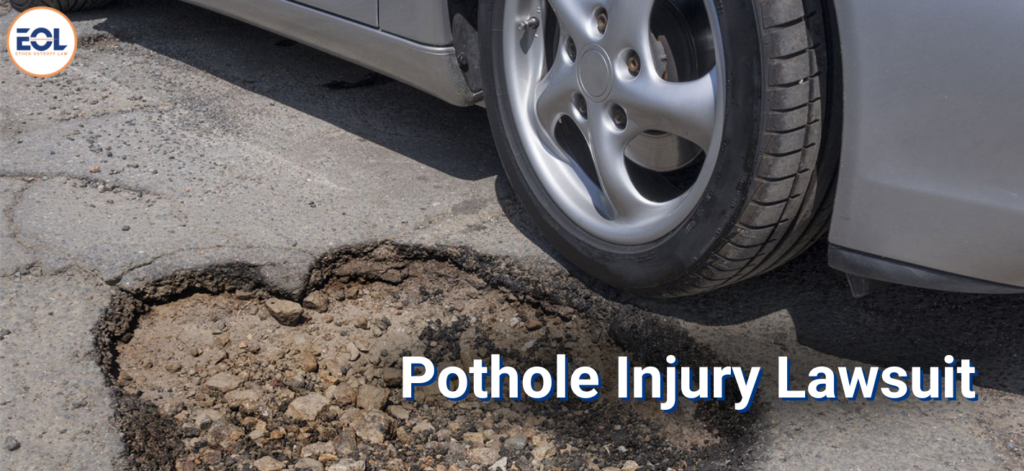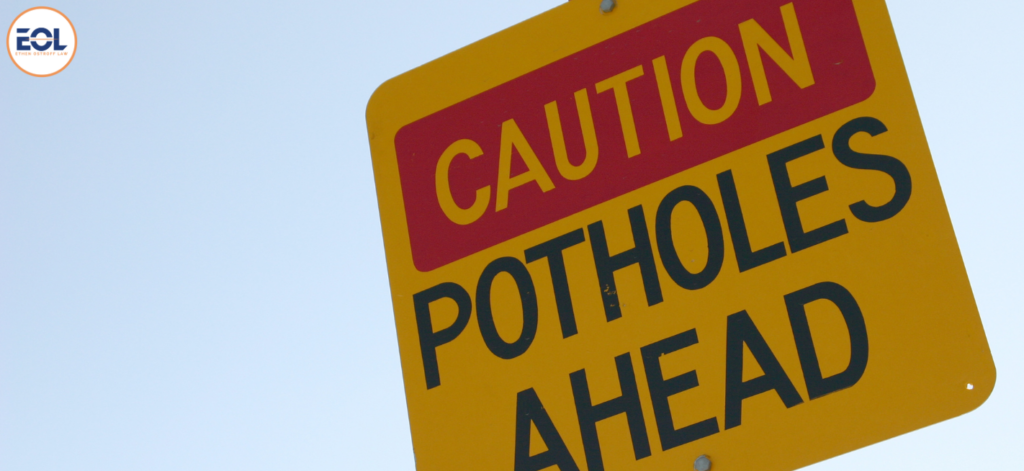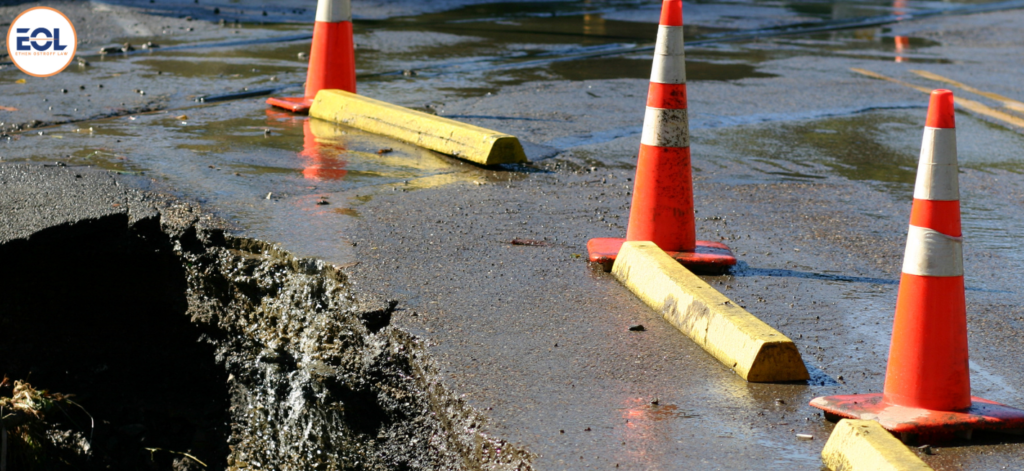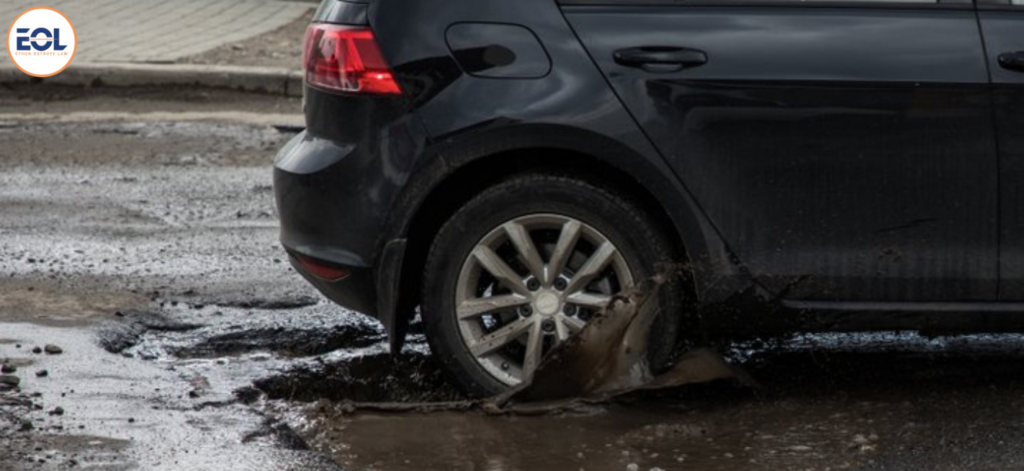Pothole Injury Lawsuit Explained
Traveling on today’s bustling roads often entails encountering potholes—a vexing and potentially perilous road hazard. These depressions, brought about by a mix of elements such as fluctuating weather conditions and intense traffic, can quickly escalate from mere nuisances to significant safety threats. But what ensues if these ostensibly innocuous potholes result in substantial physical injuries and property damage? If you’ve suffered harm due to a pothole, you retain the opportunity to pursue compensation via a pothole injury lawsuit.
What Are Potholes?
Potholes are depressions or cavities that form on road surfaces, typically as a result of wear and tear caused by various factors. These factors include weather conditions, traffic volume, and poor road maintenance. Potholes vary in size and depth, ranging from small divots to large craters, and they can pose significant hazards to motorists, cyclists, and pedestrians alike.
Common Causes of Potholes on US Roads
Potholes are a widespread issue on US roads, posing risks to vehicles and drivers alike. They form due to various factors, including:
- Chemical Exposure: De-icing chemicals corrode pavement, speeding up pothole development.
- Failures at Utility Trenches and Castings: These create weak points in pavement, promoting pothole development.
- Freeze-Thaw Cycle: Frost heaving damages pavement, creating openings for water, which accelerates pothole formation during spring thawing.
- Insufficient Drainage: Poor drainage weakens pavement and contributes to pothole formation.
- Insufficient Pavement Thickness: Thin pavement can’t support traffic during freeze/thaw periods, leading to potholes.
- Pavement Defects and Cracks: Untreated cracks allow moisture in, compromising pavement integrity and causing potholes.
- Poor Road Maintenance: Neglecting repairs allows small issues to worsen, leading to larger potholes.
- Subsurface Conditions: Soil composition and drainage affect road stability, influencing pothole formation.
- Water and Traffic: Water weakens the soil beneath pavement, while traffic applies stress, leading to pothole formation.
- Weather Conditions: Temperature changes, especially in winter, weaken pavement and create potholes.
Understanding these causes aids in reducing pothole occurrence to enhancing road safety.

Risks Posed by Potholes
Potholes bring several risks to road users, including motorists, cyclists, and pedestrians:
- Accidents: Swerving to avoid potholes or sudden jolts can cause accidents, especially in heavy traffic.
- Cyclist Hazards: Cyclists risk losing balance or falling when encountering potholes, especially at high speeds.
- Occupant Injury: Impact with potholes can injure vehicle occupants, causing whiplash or even broken bones.
- Pedestrian Tripping Hazards: Potholes can trip pedestrians, leading to sprains or fractures, particularly when obscured.
- Road Debris: Potholes scatter pavement debris, posing additional risks to vehicles and drivers.
- Vehicle Damage: Potholes can inflict significant harm on vehicles, leading to flat tires, bent rims, and other costly repairs.
Understanding these risks is vital for promoting road safety and preventing accidents, injuries, and vehicle damage.
Physical Injuries from Potholes
Potholes can cause various injuries to road users:
- Children: Kids near potholes may sustain cuts, bruises, or more serious injuries from falls.
- Cyclists: Cyclists risk falls, resulting in scrapes or bruises, or more severe injuries like fractures or head trauma.
- Elderly Individuals: Older people are at greater risk of tripping on potholes, leading to more severe injuries due to reduced mobility.
- Motorcyclists: Potholes present a serious risk of loss of control and severe injuries.
- Pedestrians: Tripping on potholes can lead to sprains, strains, or broken bones.
- Vehicle Occupants: Passengers may suffer strains or fractures from jolts caused by hitting potholes.
Property Damage from Potholes
Potholes aren’t just bad for cars—they can harm property too. Here’s how:
- Business Impact: Businesses near pothole-filled roads may lose customers, impacting their income.
- Infrastructure Issues: Potholes near utility lines or drains can cause damage, while those in parking lots or driveways create hazards for cars and pedestrians.
- Insurance Claims: Dealing with pothole-related damage often involves filing insurance claims, which can be inconvenient.
- Road Debris: Debris scattered by potholes can cause dents, scratches, or broken windows on nearby vehicles.
- Vehicle Damage: Potholes can lead to flat tires, bent rims, and other costly car issues.
Preventing Physical Injuries and Property Damage from Potholes
To prevent physical injuries and property damage from potholes, there are several proactive measures you can take:
- Avoid Swerving: Resist the urge to swerve suddenly to avoid a pothole, as this can lead to loss of control or collisions with other vehicles.
- Be Vigilant as a Pedestrian or Cyclist: Watch for potholes when walking or cycling. Be cautious to avoid tripping or losing control.
- Maintain Distance: Keep a safe distance from the vehicle in front of you to give yourself more time to react to potholes.
- Properly Inflate Tires: Maintain the recommended tire pressure to minimize damage from potholes and reduce the risk of flat tires.
- Report Potholes: If you encounter a dangerous pothole, report it to the appropriate authorities for repair to prevent accidents and damage to vehicles.
- Slow Down: Reduce your speed when driving over pothole-prone areas to minimize the impact of hitting one.
- Stay Alert: Pay attention to the road ahead and watch for potholes, especially in poorly maintained areas or after harsh weather conditions.
By following these preventive measures and staying vigilant on the road, you can reduce the risk of physical injuries and property damage caused by potholes.
Legal Options for Seeking Compensation for Pothole Injuries and Damages
Seeking compensation for pothole injuries and damages involves considering several legal options:
- Class Action Lawsuits: Join a group pothole injury lawsuit if many people are affected by the same pothole, seeking pothole injury compensation together.
- Government Claims: If the pothole is on a public road, file a claim against the responsible government for road maintenance negligence.
- Insurance Claims: Contact your insurance provider for pothole damage coverage, as policies vary.
- Personal Injury Lawsuits: Sue the government or other responsible parties for pothole injuries, proving negligence to seek pothole injury compensation for medical bills and other damages.
- Property Damage Lawsuits: File a lawsuit for pothole-related property damage, like vehicle repairs, proving negligence to seek repair cost compensation.
Consulting with a lawyer specializing in personal injury or property damage cases can help determine the best legal option for your situation.

Handling Pothole Damage to Your Property
If you suspect a pothole has damaged your property, here are steps you can take to address it and seek appropriate compensation effectively:
- Take photos of the damage.
- Report the pothole to authorities.
- Contact your insurance company and file a claim.
- Get repair estimates.
- Stay in touch with the authorities and your insurance company.
- Seek legal advice if needed.
Addressing Injuries from Potholes
If you’ve been injured by a pothole, here’s what you can do:
- Seek medical attention promptly to address any injuries.
- Document the pothole and the injuries you sustained.
- Report the pothole to the relevant authorities responsible for road maintenance.
- Consider filing an insurance claim to cover medical expenses and other damages.
- Keep thorough records of all medical treatments received and related expenses.
- If needed, seek legal advice to understand your rights and options for seeking compensation.
Can You Sue for Pothole Damage?
Yes, you can sue for pothole damage, but success depends on factors like how bad the damage is, local laws about road maintenance, and proving negligence. If a government agency is responsible for the road, they might be liable if they knew about the pothole and didn’t fix it in time. But suing them has specific rules, like shorter time limits for claims. If the pothole was on private property, the owner might be responsible for not keeping it safe. It’s important to talk to a lawyer who knows about these cases to see if you have a good chance of getting pothole injury compensation.
Can You Sue the City for Pothole Damage?
Yes, you can sue the city for pothole damage if they were aware of the pothole and didn’t fix it promptly. However, there are specific rules and time limits for suing a city. It’s best to consult with a lawyer who knows about these cases.

Car Damaged by Pothole Who Is Liable?
If your car is damaged by a pothole, who is liable depends on where the pothole is. If it’s on a public road, the government entity responsible for maintaining it might be liable. You’d need to show they knew about the pothole and didn’t fix it in time. If it’s on private property, the owner might be responsible. It’s best to document the damage, report the pothole, and consider legal advice.
Is The City Liable for Pothole Damage?
Yes, in certain situations, the city can be held accountable for pothole damage. If the pothole is on a public road maintained by the city and they were aware of it but didn’t address it promptly, they may be responsible for any resulting damage. However, liability laws differ by location. Consult with a legal expert who knows the local laws before pursuing a claim against the city for pothole damage.
Can You Sue Town for Potholes?
Yes, you can sue a town for pothole-related damages. If the pothole is on a road maintained by the town and they were aware of it but didn’t repair it promptly, they may be liable for any resulting damage or injuries. However, suing a town involves specific legal procedures. Consult with a lawyer who specializes in such cases to know your options.
Filing a Claim with the City or Town for Pothole Injury Compensation
Filing a claim with the city or town for pothole injury compensation is straightforward. Here’s how:
- Identify the Right Department: Determine the city or town department in charge of road maintenance, often the Public Works or Transportation Department.
- Get Contact Details: Find the department’s contact information on the city or town’s website.
- Submit Your Claim: Follow the city or town’s claim procedures, which might include filling out a form or providing damage documentation.
- Provide Evidence: Include photos of the pothole and damage, repair receipts, or witness statements to support your claim.
- Follow Up: Stay in touch with the department to ensure they process your claim.
- Seek Legal Advice If Needed: Consider consulting a lawyer familiar with local procedures if you encounter difficulties.

Filing Pothole Injury Lawsuit
Filing a pothole injury lawsuit involves taking legal action against the party or entity responsible for the pothole, seeking compensation for injuries sustained as a result. The legal process typically involves several steps:
- Assess Your Case: Determine if you have a valid claim based on your injuries and the circumstances.
- Consult an Attorney: Get advice from a specialized attorney who can help you understand your options and navigate the legal process.
- Gather Evidence: Collect proof of the pothole and your injuries, like photos and medical records.
- Notify the Defendant: Your attorney will officially inform the responsible party about your pothole injury lawsuit.
- Discovery Phase: Both sides exchange information relevant to the case.
- Negotiate or Trial: Try to settle the pothole injury lawsuit out of court or go to trial if needed.
- Resolution: If successful, you may receive pothole injury compensation.
- Appeal (If Necessary): Either party can appeal the court’s decision if they disagree.
Supporting a Pothole Damage Claim
Here are the steps to support a pothole damage claim:
- Take photos of the pothole, showing its size, depth, and location.
- Photograph any damage to your vehicle caused by the pothole.
- Collect contact information and statements from witnesses.
- Get repair estimates from shops for the damage.
- Note the location, date, and time of the incident, along with weather and traffic conditions.
- Check if the pothole was previously reported and to whom.
- Provide evidence of your vehicle’s condition before the incident.
- Show that the responsible authority failed to fix the pothole despite knowing about it.
Common Reasons Pothole Injury Claims Are Denied
Knowing why claims get denied can improve how people file claims and deal with challenges when seeking compensation for pothole injuries. Here are common reasons why pothole injury claims may be denied:
- Dispute Over Responsibility: There’s disagreement about who’s responsible for the pothole or the accident.
- Governmental Immunity: Sometimes, the government is immune from being sued.
- Incomplete Documentation: There’s not enough paperwork or proof provided with the claim.
- Insufficient Evidence: Not enough clear proof like photos or details about the pothole and the damage.
- Legal Immunity: Laws protect the government from certain claims, like pothole injuries.
- Procedural Errors: Claim isn’t filed correctly or on time.
- Shared Fault: The person filing the claim also did something wrong, like driving too fast.
Available Pothole Injury Compensation
Pothole injury compensation can cover various damages, including:
- Loss of consortium.
- Lost wages.
- Medical expenses.
- Pain and suffering.
- Property damage.
- Punitive damages.
Compensation amounts vary depending on factors like injury severity, property damage, insurance, and laws. A qualified attorney can assess your claim and determine potential pothole injury compensation.
Ethen Ostroff Law for Your Pothole Injury Lawsuit
At Ethen Ostroff Law, we are assisting individuals who have suffered injuries or damages due to potholes. We have a track record of successfully handling pothole injury cases and ensuring clients receive the compensation they deserve. If you’ve been injured due to a pothole, reach out to Ethen Ostroff Law.


